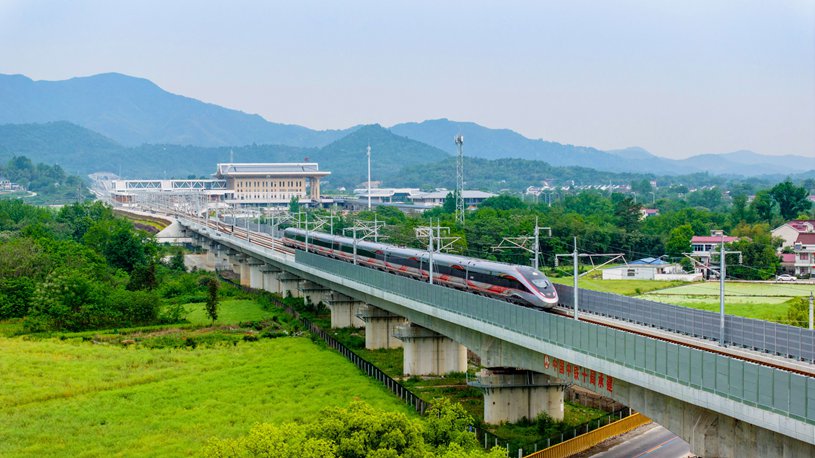* The dynamism of the China market has long been seen by many European businesses as an important contributor to their global competitiveness.
* In addition to manufacturing capabilities, convenient logistics also makes China an ideal supplier of almost everything.
* "The key question isn't whether or not I should invest in China so much as how much I should invest," Ray Dalio wrote.
BEIJING, April 27 (Xinhua) -- For those who just sit in offices and focus solely on numbers, it will remain an open question whether China is losing its allure to multinational corporations and becoming "un-investable."
Foreign direct investment (FDI) in China experienced a year-on-year decrease in the first quarter of this year, while the number of newly established foreign-invested companies saw a significant growth of 20.7 percent. Moreover, FDI in high-tech manufacturing occupied a larger proportion of the total.
Behind these figures are global investors exiting the China market en masse or increasing their bets instead?
Xinhua reporters travelled to the country's eastern and southern regions, where most foreign-funded firms are located, to learn about their take on investing in China and what they are doing and planning to do.
"RISKY" TO DECOUPLE
U.S. food giant Kraft Heinz's Asia headquarters, which was relocated from Singapore to Shanghai due to "the growing importance of China business," was officially certified recently by the Shanghai government.
"China has a large population and vast market space, and the demand for diversified and high-end consumption is increasing day by day," said Frederico Freire Jardim, Asia President of Kraft Heinz, which will invest 320 million yuan (45 million U.S. dollars) in China this year after investing 670 million yuan over the past three years.
German chemical giant BASF's Verbund site in Zhanjiang city, south China's Guangdong Province, months ago started production of TPU, a material widely used in new energy vehicles (NEVs), biological medicine and other sectors.
"China is now the world's largest chemical market and it has great strategic importance for BASF," said Haryono Lim, President of Mega Projects Asia, BASF (China) Company Ltd., Shanghai.
The Verbund site in Zhanjiang with a total investment of some 10 billion euros (10.7 billion U.S. dollars), which is BASF's largest ever overseas investment, will become an important platform for the company to achieve profitability and sustainable growth in China in the future, Lim added.
Many other multinationals are also striking gold in the gigantic market of the world's second largest economy that grew 5.2 percent last year despite the lukewarm global recovery.
In fiscal year 2022/23, ZEISS in Greater China generated annual revenue totaling 13.5 billion yuan, up 22 percent compared to the prior year. Bosch Group's sales in China increased 5.2 percent last year to 139.1 billion yuan, which accounted for about one fifth of its global total.
The dynamism of the China market has long been seen by many European businesses as an important contributor to their global competitiveness, according to a report by the European Union Chamber of Commerce in China.
"Many members view detaching from the Chinese market as being the main risk to their global operations," the report read.
"CRITICAL" SUPPLY CHAIN, INNOVATION
In Rugao city of east China's Jiangsu Province, workshops of Swedish truck maker Scania are being built in full swing. The new factory is expected to launch production in 2025 and effectively raise the company's global production capacity with an annual output of 50,000 trucks.
Mats Harborn, President of Scania China Group, hailed China's leading position in innovation, particularly in areas such as electrification, autonomous driving and intelligent connected vehicles.
"We want to tap into the innovative power of China and also its supply chains," Harborn told Xinhua, explaining why Scania made its largest overseas investment in over six decades.
Boasting the most complete and largest industrial system on the planet, China has been the world's No.1 manufacturing country for 14 consecutive years, with the added value of the manufacturing sector accounting for about 30 percent of the world's total.
In addition to manufacturing capabilities, convenient logistics also makes China an ideal supplier of almost everything. According to the Logistics Performance Index compiled by the World Bank, China outperforms developed economies like the United States in terms of logistics infrastructure.
A report by the auditing and consulting firm PwC showed that over 70 percent of surveyed multinational firms highly recognized the unique advantages of China's supply chain.
"There's no supply chain in the world that's more critical to us than China," Apple CEO Tim Cook said last month in Shanghai, reiterating the company's long-term commitment to the Chinese market.
The era of China attracting foreign investors with low-cost labor has ended, and its vast talent pool has instead become a new draw for companies like Apple.
"The products we do require advanced tooling. In the United States, I am not sure our tooling engineers can fill a room. In China, you can fill multiple football fields," Cook said.
"POSITIVE" BUSINESS FORECAST
Since the start of the year, foreign businesspeople have been flocking to China in hope of leveraging new business opportunities as China continues to deepen reform and opening up as well as pursue high-quality development.
Earlier this month, German Chancellor Olaf Scholz visited Chongqing, Shanghai and Beijing, accompanied by senior executives of such multinational companies as Siemens, BMW and Mercedes-Benz.
Venues of the China Development Forum, the Boao Forum for Asia, the China International Consumer Products Expo and the China Import and Export Fair were all bustling with big names seeking win-win cooperation.
"China's reaffirmed pledge to further open-up and improve the business environment, especially the government's vow to protect intellectual property rights, gives us strong confidence to continue investing in China," said Kim Fausing, President and CEO of Danfoss, a Danish energy efficiency solution company.
During the China Business Climate Survey 2024 conducted by the American Chamber of Commerce in China, its member companies reported "a more positive two-year business forecast, driven by opportunities in carbon neutrality and expectations of continued economic reforms in China."
The upbeat sentiment was confirmed in the 2024 Kearney FDI Confidence Index, where China jumped from the seventh position to the third, and also retained the top place of emerging markets.
"The key question isn't whether or not I should invest in China so much as how much I should invest," Ray Dalio, founder of the world's largest hedge fund Bridgewater Associates, wrote in a recent article.
(Reporting by Shi Hao, Tai Beiping; Video reporters: Ding Ting, Zhou Rui, Ren Jun, Xie Han; Video editors: Ma Ruxuan, Luo Hui) ■












